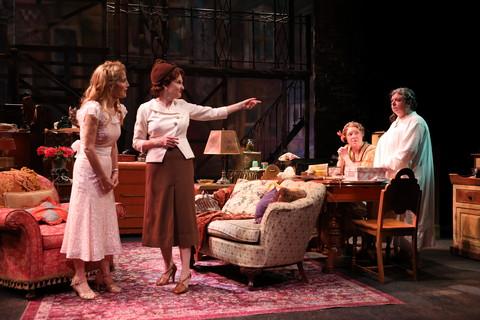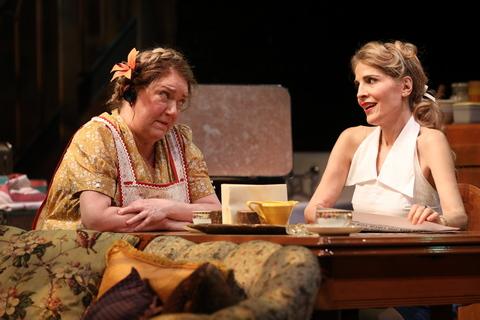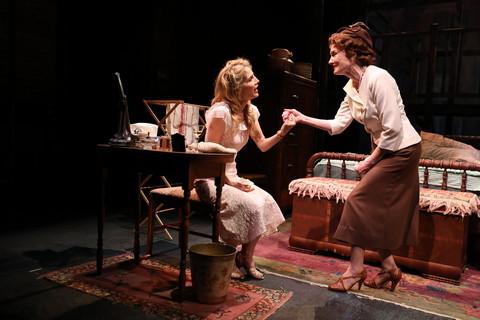A Lovely Sunday for Creve Coeur
Rarely revived one-act by Tennessee Williams still plays like a prequel to “A Streetcar Named Desire” with a schoolteacher on the verge of a nervous breakdown.

Jean Lichty, Annette O’Toole, Kristine Nielsen and Polly McKie in a scene from “A Lovely Sunday for Creve Coeur” (Photo credit: Joan Marcus)
[avatar user=”Victor Gluck” size=”96″ align=”left” ] Victor Gluck, Editor-in-Chief[/avatar]It is rather surprising that Tennessee Williams’ 1979 long one-act play, A Lovely Sunday for Creve Coeur isn’t revived more often as it is not only a fine script but with its requirements of only one set and juicy roles for four actresses it has a great deal going for it. Unfortunately, Austin Pendleton’s production at the Theatre at St. Clements does not do the play justice nor give it its best shot.
What gives A Lovely Sunday for Creve Coeur its special cachet in the Williams canon is that its storyline and heroine called Dorothea very much suggest a prequel to A Streetcar Named Desire set ten years earlier, when Blanche was still teaching and coping with life, though already needing liquor and pills to get her over her anxieties. Some enterprising theater group ought to schedule these two plays in repertory with the same actress in the leading role in each.
The play takes place in Depression Era St. Louis, circa June 1937, in a rather déclassé part of town. Dorothea Gallaway, a former Southern Belle and now a high school civics teacher, is sharing an apartment with Bodey Bodenhafer, a slovenly but generous middle-aged woman who is hard of hearing. On many Sundays, Bodey has convinced Dotty to visit the amusement park at Creve Coeur along with her twin brother Buddy who has developed an unrequited love for Dotty. Dotty is not the least bit interested in this cigar-chomping, beer-guzzling robust man, but she herself is in love with T. Ralph Ellis, her upper-crust high school principal who she has quietly been dating in past weeks. Dotty is described as having asthenia and taking Mebaral for her anxiety attacks.

Kristine Nielsen and Jean Lichty in a scene from “A Lovely Sunday for Creve Coeur” (Photo credit: Joan Marcus)
Not only is Dotty not planning to go on Bodey’s picnic on this particular Sunday to meet Buddy, she plans to stay home to await a promised phone call from Ralph that is long in coming. However, the day proves memorable for another reason: her colleague, the chic and aristocratic Helena Brookmire, drops in unannounced to pick up the check for the first month’s rent on a furnished Westmoreland Place duplex that she and Dotty are planning to move into during the summer. And both she and Bodey have seen an announcement in the society pages about Ralph that Bodey does not want to ruin Dotty’s day. When Miss Gluck, the bereaved German-speaking upstairs neighbor who has just lost her mother, arrives for coffee and crullers and floods the bathroom, it seems like this is just the last straw for both Dottie and Helena. Ultimately, the play is about female loneliness for single women who are past their best years and unlikely to find marriageable partners.
As always, Williams’ stage directions are very specific as to the milieu the women are living in. The apartment set is described by Helena as having a purple carpet, orange drapes, yellow lamp shades and red roses on the wallpaper, in short an explosion of colors in very bad taste. However, Harry Feiner’s set design which gets the claustrophobia and cluttered quality of the living room does not bring this clashing color scheme to reality. Also the back wall of the set with wooden scaffolding suggesting windows and stairs to an upper floor is so busy that it is simply a distraction. The view of the street is mostly blocked by this so that it is difficult to tell what we are seeing or the environment. On the other hand, Beth Goldenberg’s costumes are redolent of the era and immediately define each woman.
Even more damaging is the fact that Pendleton has allowed the actresses to use entirely different styles, suggesting that they are from four different plays. As the Southern Belle on the verge of a nervous breakdown, Jean Lichty seems to be playing Blanche du Bois rather than Dorothea Gallaway who is not as far gone into her illusion and her fantasies. Lichty gives a similar breathy performance to the ones she gave in both the revivals of Williams Inge’s A Loss of Roses and Horton Foote’s The Traveling Lady. Kristine Nielsen is most identified with creating brilliantly eccentric roles in Christopher Durang’s outrageous farces. Though she is more toned down here than in those plays, her expansive comedic style with a great many hand gestures is at odds with the down-to-earth Bodey and she unbalances the play in the direction of farce.

Jean Lichty and Annette O’Toole in a scene from “A Lovely Sunday for Creve Coeur” (Photo credit: Joan Marcus)
Annette O’Toole who has impressed in recent years with her challenging roles in the musical Southern Comfort and in Tracy Letts’ The Man from Nebraska is both elegant and haughty as Helena, the art teacher with ideas possibly above her station. However, she appears to be in a drawing room comedy which none of the other actresses are in. As the bereaved Miss Gluck who mainly speaks German, Polly McKie is both ponderous and lumbering, making her role laughable rather than pathetic. Worst still is that with a running time of 110 minutes, this slight play in which little happens and much is foreshadowed early in the story overstays its welcome long before it is over.
A Lovely Sunday for Creve Coeur is one of Williams’ best late career plays as he is describing characters and places he knew well. While the play should be heartbreaking as each of the women reach for something out of their grasp, Austin Pendleton’s production is unwieldy where it should be graceful – after all, these women are trying to keep up appearances though they are not succeeding. Though the play’s four actresses are working hard, their acting styles seem to be at odds with each other. A pity as A Lovely Sunday for Creve Coeur has not had a major New York production since 1979, but this isn’t it.
A Lovely Sunday for Creve Coeur (through October 21, 2018)
La Femme Theatre Productions
Theatre at St. Clement’s, 423 W. 46th Street, in Manhattan
For tickets, call 866-811-4111 or visit http://www.LaFemmeTheatreProductions.org
Running time: one hour and 50 minutes with no intermission






What a great idea: Have Tennessee William’s earlier play paired with “A Streetcar Named Desire”—both roles played by the same actress. That would be fun.